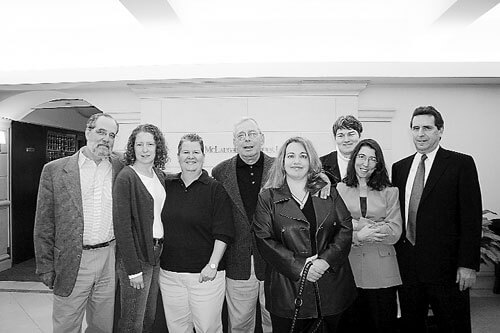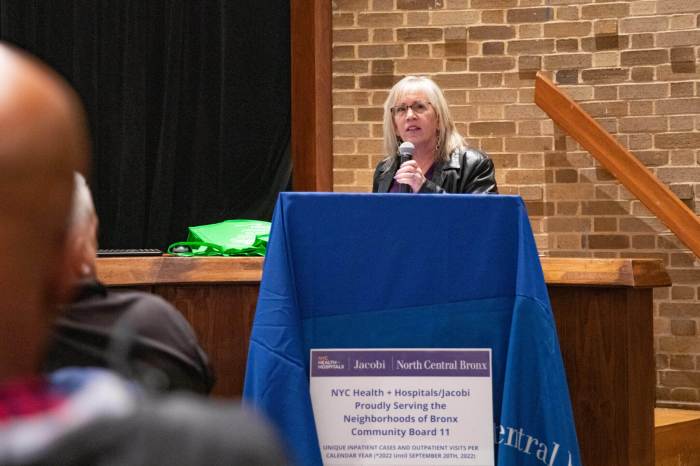VOLUME 3, ISSUE 344 | October 28 – November 3, 2004
NEWS
Judge Rejects NY Marriage Claim
Upstate court rejects suit led by Nyack’s gay mayor on both statutory and constitutional grounds
Rockland County Supreme Court Acting Justice Alfred J. Weiner rejected a petition by ten same-sex couples from the town of Orangetown seeking marriage licenses in a ruling issued on October 18.
The decision differed from two rulings by Ulster County judges in New Paltz earlier this year who found New York’s denial of same-sex marriage unconstitutional in the course of dismissing criminal charges against New Paltz’s mayor, Jason West, and two ministers who performed weddings for same-sex couples who did not have validly-issued licenses. Weiner found that the state has a “valid purpose of preserving the historic institution of marriage as a union of man and woman, which, in turn, uniquely fosters procreation.”
The plaintiff group is led by Nyack’s mayor, John Shields, who was turned down when he and his partner applied in March to the Orangetown town clerk for a marriage license, and is represented by Norman Siegel, who was the longtime executive director of the New York Civil Liberties Union and is now in private practice. According to Weiner’s opinion, the town clerk had received a written advisory from the state Department of Health, based on an informal opinion letter that was issued by the office of Attorney General Eliot Spitzer, taking the position that licenses may not be issued to same-sex couples, and warning that issuing such a license could be treated as a misdemeanor under the state’s penal law.
The plaintiffs, called “petitioners” in this case, argued that the gender-neutral definition of marriage contained in New York’s marriage law means that the clerk should be ordered to issue them licenses, and argued alternatively that if the current law does not allow for such licenses, then it violates the state Constitution.
Weiner rejected both arguments.
Focusing first on the issue of interpreting the state marriage law, Weiner noted that although the definition of marriage contained in the law makes no references to gender, many other provisions of the law do, including a provision requiring that a marriage be “solemnized by each person declaring ‘that they take each other as husband and wife,’ and that the clerk obtain information from the ‘bride’ and ‘groom’ during the application process.” He also noted that other provisions of the law dealing with annulments, divorces and separations also contain references to “husbands” and “wives.”
Perhaps more central to his decision, however, was the daunting body of prior New York court decisions, including a ruling by the New York Appellate Division, 2nd Department, which is a binding precedent for any Rockland County trial judge, ruling that the marriage law does not allow same-sex couples to receive licenses or be married. The prior rulings, in addition to noting the many references in law to “husbands” and “wives,” also adopted the view that statutory language must be interpreted in line with the legislative intent at the time a statute is passed. There is no indication that the Legislature ever intended to authorize same-sex marriages, Weiner found.
Turning to the constitutional issue, Weiner wrote his opinion as if major developments in gay law since 1996, when the Supreme Court decided in Romer v. Evans, striking down Colorado’s anti-gay Amendment 2, that anti-gay discrimination violates the federal equal protection clause, had not occurred. Specifically, Weiner fails to discuss the significant rulings of the past year and a half, starting with the expansive “liberty” holding by the U.S. Supreme Court in the Lawrence v. Texas sodomy case and continuing through the historic same-sex marriage ruling by the Massachusetts Supreme Judicial Court in Goodridge, and important subsequent same-sex marriage rulings from trial judges in Oregon and Washington. The courts in all three of those states applied state constitutional provisions similar in scope to those afforded in New York.
The only reference to Lawrence is to Justice Sandra Day O’Connor’s statement, in her concurring opinion, that the states might have a legitimate interest in “preserving the traditional institution of marriage.” O’Connor’s statement is not part of the binding majority ruling in the case.
Although Weiner was considering a challenge raised under New York’s constitution, these decisions from other jurisdictions are important because they discuss and reject the very same arguments that Weiner accepted from the state in this case, especially the spurious argument linking marriage and procreation. While Weiner cites some U.S. Supreme Court decisions to support that point, at least by inference, he failed to cite an important Supreme Court decision cutting the other way, Turner v. Safley from 1987, in which the Court struck down a regulation against state prisoners getting married, rejecting the state’s argument that since prisoners did not enjoy conjugal visits, such a marriage would be meaningless because it could not produce offspring. In that opinion, the Supreme Court decisively rejected the argument that marriage is only or principally about procreation.
After following state precedents binding in the 2nd Department that anti-gay discrimination is subject the lowest level of judicial scrutiny—that it need merely have some rational basis—Weiner asserted, with no discussion, that preserving “the historic institution of marriage as a union of man and woman” is a “valid public purpose.” Weiner made no attempt in his opinion to explain why this is a valid purpose, when examined in the light of the gross inequalities that exclusion from marriage works on same-sex couples, which are detailed at great length in the recent marriage opinions from other jurisdictions.
In short, the ruling reads like a “know-nothing” opinion, and there has been speculation in the press that this is all about Acting Justice Weiner’s hope to win election to a Rockland Supreme Court seat by not issuing a controversial opinion. It is fair to note, however, that Weiner’s ruling is constrained by the fact that the 2nd Department Appellate Court previously rejected a constitutional challenge to the marriage law, and he was technically bound by that precedent. Trial courts may not reverse decisions by the courts to which their decisions are appealed—only an appellate court can reconsider existing precedents in our legal system. On the other hand, Weiner could have noted the disparity between that appellate precedent, which dates from 1993, and the more recent legal developments elsewhere.
Nobody expected to win this case at the trial level in any event. The matter will be appealed to the 2nd Department, which is already considering an appeal in the Langan case, in which a trial judge in Nassau County, John Dunne, had ruled that the surviving partner from a Vermont civil union could bring a wrongful death action, with standing as a spouse, for his loss stemming from alleged medical malpractice by Manhattan’s St. Vincent’s Hospital in the treatment of his partner. Under New York law, such lawsuits can only be brought by a surviving legal spouse.
Siegel, in a telephone interview, noted the failure of Weiner’s decision to take sufficient account of recent judicial thinking.
“The legal analysis is unpersuasive, both from a statutory and a constitutional perspective,” he said. “In many cases, the decision is merely a collection of conclusory statements. He does not mention, never mind discuss the seminal Goodridge vs. Department of Public Health in Massachusetts. I disagree with the conclusion that the case does not involve fundamental rights and that the issue must be resolved in the Legislature.”
Siegel said that he would appeal the ruling within the 30-day time frame required, but speculated that this case would likely be combined in the appellate process with lawsuits filed in Manhattan by Lambda Legal and in Albany by the American Civil Liberties Union.
Lambda issued a statement reiterating its faith that New York would follow in the footsteps of Massachusetts.
“We believe same-sex couples have the same fundamental right to marry as any other couple under the New York State Constitution, and we’re pursuing that aggressively in our lawsuit that’s pending in Manhattan,” said Susan Sommer, Lambda’s supervising staff attorney, in a written statement. “No doubt this question—whether same-sex couples have an equal right to marry under the state’s Constitution—will be answered by the state’s high court.”
Paul Schindler provided additional reporting on this story.


































